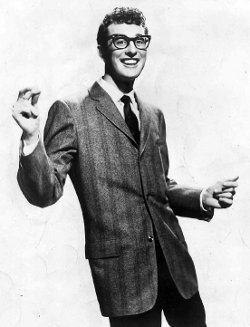You Know They've Got a Hell of a Band

Acknowledge it. This is a little scary.
Story: "Y'all Know They Got a Hell of a Band," collected in Nightmares and Dreamscapes. Written in 1992. Wikipedia entry here. Read my introduction to this weblog serial.
Spoiler-filled synopsis: Two hapless travelers become lost in the woods and come across a creepy 1950s-styled pocket-sized town, where the ghosts of dead rock 'n' roll musicians endlessly relive their glory days… much to the dismay of innocent passersby who are forced to listen to them. Forever.
My thoughts: Stephen Male monarch loves his rock 'n' curlicue. Read more than 100 pages of Rex's writing and you're certain to run into a tribute to the music of his youth—equally the introductory quote to a novel, in the form of lyrics stuck in a protagonist's caput, or playing in the background of a memorable scene. Classic rock clearly means a lot to King, and in "Y'all Know They Got a Hell of a Ring," where King imagines a magical reunion of rock legends as a nightmare, you know he's having fun with his own obsessions.
Music is a theme in this story from the start; although protagonist Mary and her husband Clark don't encounter the Rock 'n' Roll Reunion from Hell until midway through the story, King repeatedly calls attention to the music they're listening to (Lou Reed) as they get more and more lost in the Oregon wilderness.
And they practise spend quite a while getting lost. Other writers might cakewalk through this obligatory set-up sequence, but King takes his time, and it works to the story'southward benefit. Nosotros spend this time getting to know Clark and Mary through their banter and increasing irritation with each other. There are sure types of character interactions that King depicts very assuredly, and this is one of them: spouses who sincerely beloved each other just who are long past the honeymoon stage of spousal relationship and have since discovered their partner's quirks to be both endearing and maddening (sometimes both simultaneously), depending on the context. I'm sure King's long, successful union to his married woman Tabitha is a large part of what makes these depictions conceivable and even charming. Subsequently just 10 pages of this, I find myself liking Clark and Mary quite a scrap.
But moving along: after wandering lost a while (this story takes place before cellphones and GPS devices were commonplace or fifty-fifty imaginable), the two stumble beyond a picturesque, nostalgic petty all-American town with the cutesy name of "Rock and Roll Sky," planted inexplicably in the middle of a huge creepy woods wilderness. King often allows his protagonists a certain meta-awareness of their horror-story plights; Mary immediately recognizes that the too-perfect town is creepy as heck, and fifty-fifty mentions its evocation of Twilight Zone episodes and Ray Bradbury stories.
Digging upward the horror lurking behind friendly facades is some other classic King trope, and it'southward not long at all earlier Mary and Clark come up face to face up with the truthful masters of this too-adept-to-be-true Norman Rockwell hamlet: zombie stone musicians. Janis Joplin, Buddy Holly, Roy Orbison, Jimi Hendrix, and of course Elvis are not exactly alive, but they are well hither. The story ends on a rather delightfully chilling annotation, as Mary and Clark observe themselves trapped—a literal captive audience for a rock concert that, information technology is suggested, may just go along forever.
The idea of an afterlife reunion of tragically deceased rock stars has the potential to be sweetly melancholic rather than horrifying. Rex addresses this past calculation a characteristically gruesome touch: the dead rock stars aren't mournful ghosts, merely disgusting, decaying zombie corpses obsessed with reliving their glory days. (If Rex had written this story a few years later, he might have made Gen-Xers squirm by calculation Kurt Cobain and Layne Staley to the roster.) Information technology works, and produces some memorable imagery: the mental picture of a jukebox filled with blood and gore has stuck with me over the about 20 years since I start read this story, and it's nevertheless as disgusting equally e'er.
Speaking of characteristic Rex themes, we get a thumbnail version of Male monarch'southward Job-like have on the theological Trouble of Evil, developed more than heavily in other King books but non elaborated upon hither:
This had not happened because they were evil people; it had not happened considering the old gods were punishing them; it had happened because they had gotten lost in the forest, that was all, and getting lost in the wood was a thing that could happen to everyone.
All in all, this is a slap-up story, mixing familiar horror tropes (lost in the woods! small town with a dark secret!), better-than-average characters and dialogue, and a comically ill premise. King's sense of humour runs through it every bit well, and I suspect he was smiling every bit he typed this i up. (At one point, deceased rockers Ronnie Van Zant and Duane Allman look to Mary like "the sort of fellows who dropped out of high schoolhouse the third time through the tenth grade in social club to spend more fourth dimension meditating on the joys of drive-railroad train linkages and date-rape.") Highly recommended, and a skilful commencement to my October Stephen Rex reading.
Next up: "Jerusalem'due south Lot," from Night Shift.
by ![]()
Source: https://stagingpoint.com/2013/10/01/stephen-king-short-story-project-1-you-know-they-got-a-hell-of-a-band/
0 Response to "You Know They've Got a Hell of a Band"
Post a Comment